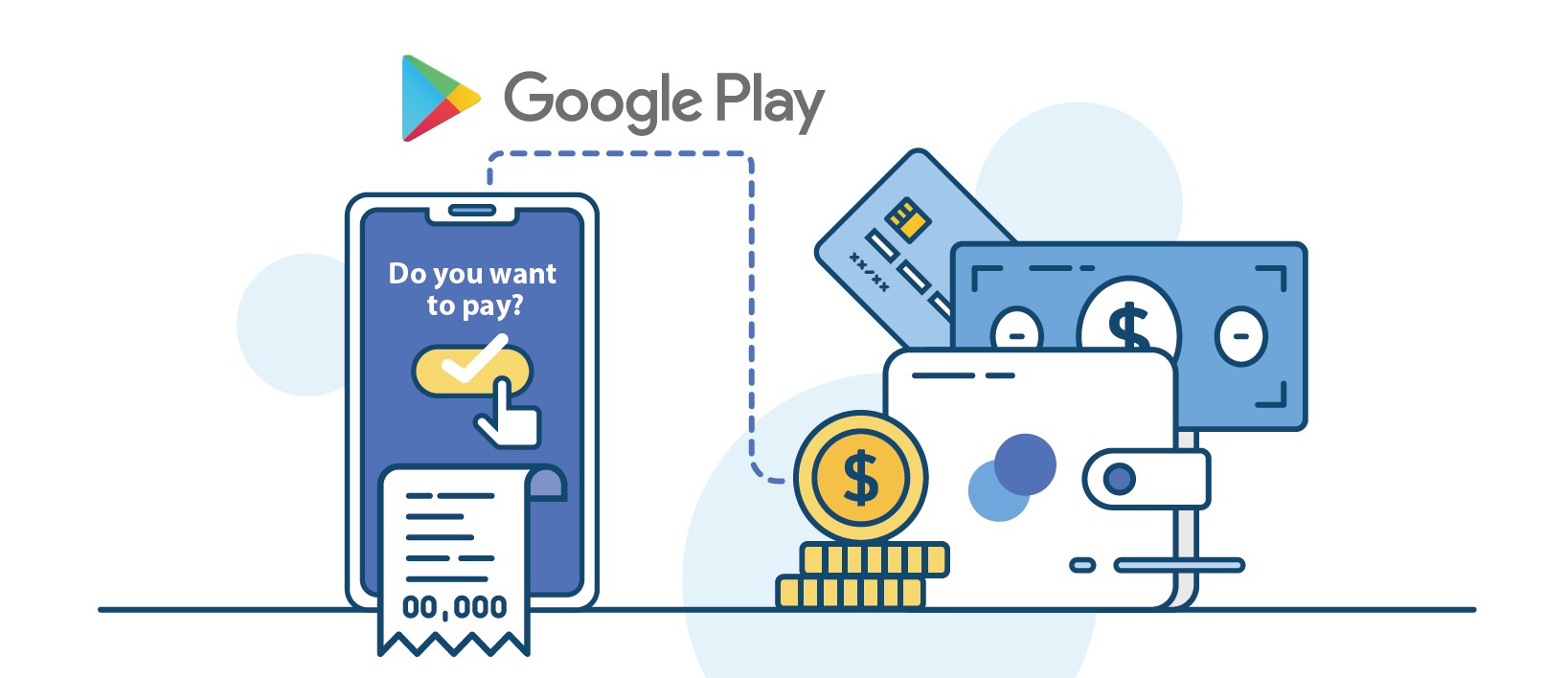
Google, which has a share of the app store market that no one can compete with, has declared that in-app payments will be compulsory for all apps in Google Play from this October. And, of course, what do people use the most while using their smartphones? Applications. To listen to songs, search the Internet, and chat with others, the use of applications is necessary, and an app store is a place for buying these apps. Google Play, based on the Android platform, and the Apple App Store, based on the iPhone Operating System (iOS), are the most widely recognized app stores. Regarding Google’s position, the Sungkyun Times (SKT) will investigate what in-app payments are, the problems of forcing in-app payments, the pros and cons, and the prospects for in-app payments in the future.
What is an In-app Payment?
App Stores, Prerequisite of App Circulation
An app store is a marketplace for selling applications used by smartphones. Depending on the mobile Operating System (OS), Google Play and the Apple App Store are representative stores. Plus, there is also the Galaxy Store from Samsung Electronics and the ONE Store from the three mobile carriers (SKT, KT, and LG U+) in Korea. Companies or individuals that develop apps sell them to users through app stores and pay fees to Google or Apple. Excluding a paid app or a free app that requires in-game payment, developers can freely present the app if there is no infringement of copyright in introducing it. Developers can also allow users to download the Android Application Packages through their websites without using the app store. However, this is not recommended due to low accessibility and high-security concerns such as hacking and exposure to malicious codes. In addition, Google Play is one of the default app stores for mobile phone purchases. It has almost 70% of the app store share in Korea and enjoys monopoly status.
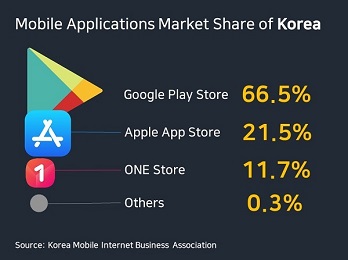
Definition and Methods of In-app Payments
As app stores are used in many countries, and each country provides various payment methods, there can be inconveniences regarding some app payments and in-game payments. Accordingly, the internal payments developed by Google are called “in-app payments”. These payments are conducted through credit cards, various simple payments, and micropayments of smartphones. In Korea, Kakao Pay, credit cards, and phone payments are available, and in April, Naver Pay also became interlocked with in-app payments. Using in-app payments, “one-tap buy” is possible through biometrics. Also, methods that are already registered in Google Play can be reused for purchasing game apps or ingame paid items and contents. In Google’s in-app payment system, Google takes 30% of the app’s sales when users make in-app payments. Previously, Google made this system mandatory only for game apps, but in addition to game apps, Google also announced that it would be obligatory for webtoons, music, and video apps from October 2021. Google’s domestic sales earned from payments were about $4 billion as of 2018, and they are expected to grow further if fees are expanded to non-game apps.
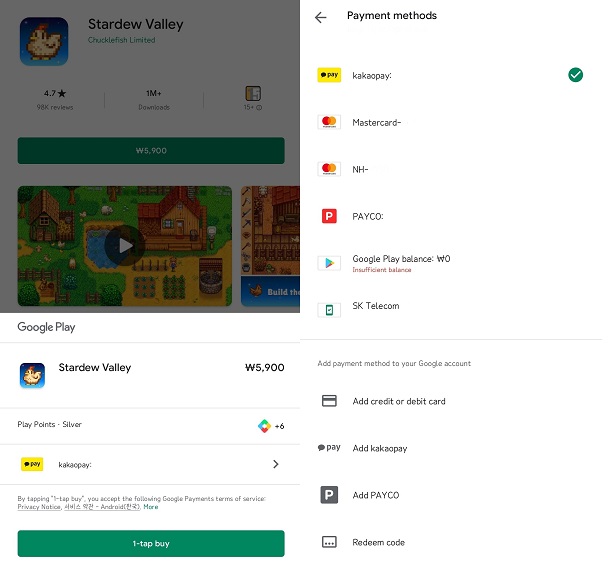
Controversy of Compulsory In-app Payments
Issues with Compulsory In-app Payments
➊ Bigger Burdens of Content Providers
Naver and Kakao, which have not paid fees to Google before, are used as platforms for various webtoons and web novels. Writers who serialize these platforms pay up to half of their profits to platforms. In these situations, additional fees imposed by Google aggravate the burden. Moreover, it is hard to introduce external payments because the service model mostly requires paying for each episode, which means webtoons and web novels cannot connect users via external links whenever they try to pay. On the other hand, e-books, music, and video streaming services use monthly subscriptions, so users do not have to pay manually. Once they register the payments on companies’ websites, payments are automatically conducted on a regular basis. This is how to bypass in-app payments. Major companies such as Netflix and Spotify, which can counter Google to some degree, can induce users to use external payment systems without accepting Google’s in-app payment policy. However, companies in Korea which are weaker than the major companies such as TVing and Melon cannot use this detour route because Google refuses to approve regular and constant updates on purpose. What is more worrying is that no one can refute the highhandedness of Big Tech (big IT companies such as Google, Amazon, and Apple). The backlash can be seen as more severe because Google had been growing with domestic developers emphasizing openness, unlike Apple, which originally insists on the closed characteristic of OS.
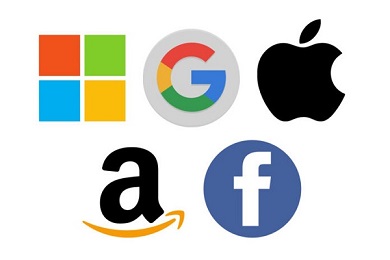
➋ Disadvantage of Users and Turmoil in the Market
Many content providers who cannot give up huge app distributors have been forced to back down on Google’s fees. This does not end the disadvantage of providers but expands the disadvantage of consumers and threatens the market system by forming illegal contents distribution markets. For example, to buy the episode of a webtoon on Naver Webtoon, goods named “cookies” are required. Until now, Android users purchased at $0.09 per cookie, but if Google’s 30% fee is applied, the price of one cookie will be increased to $0.1 each. As the side effects of this fee increase, illegal downloads and illegal content use that are already a serious problem can prevail. In addition, it has become inevitable that the prices of subscriptions will be raised for services that require regular payments such as cloud services, music, and video streaming services. As consumers’ purchasing desires decrease due to such rising consumer prices, the market will slow down and stall, threatening the development and growth of domestic mobile contents industries and ecosystems.
Public Opinions Agreeing to Compulsory In-app Payments
➊ Expected Fee Collection
Purnima Kochikar, a Director of Google Play Apps & Games, said, “More than 98% of developers already comply with this long-standing policy.” In addition, only 3% of global developers sell digital goods (digital content, represented by music, movies, comics, and games), and 97% who do not sell digital goods have nothing to do with this policy. It is not related to the policy if it deals in real goods or services, such as Coupang, Baemin, and Kakao T. The 30% fee collection was also enacted in general app stores such as the Apple App Store, Steam, and Nintendo eShop. Furthermore, the ONE Store, which has significantly lower attraction power than Google, charges a 20% fee. If Google cuts the fee from 30% to 20%, it can make the ONE Store’s competitiveness lower and kick it out of the app store ecosystem. Therefore, Google’s 30% fee collection contributes to the sustenance of other competitors. In addition, Google does not take all the fees as a profit. It also settles with the payment partners who provided the payment methods and uses fees for server maintenance, labor, and various campaigns.
➋ Function for Consumers
Among complaints about the app store, the complaints related to payment were the most common. There were problems such as users not being able to use virtual money after making purchases in apps or duplicate charges. Mostly, users complained or requested refunds to Google Play rather than understanding the situation properly. According to research in August by Unicorn, an organization that studies companies’ innovation strategies, 80.6% of respondents said they would prefer a complete management system through an in-app payment. Also, they pointed out the inconveniences when using individual payment systems were “different payment methods for each app” and “refund and cancel process through individual developers”. So if Google unifies the payment system and only uses that, these inconveniences will decrease and refunds can be processed efficiently. In addition, Google creates an environment where the free app store can be operated and maintained by using fees earned through in-app payments. This allows users to use about 95% of apps free of charge on Google Play and allows developers to distribute their apps easily and safely.
To Prevent “High-handedness”
Introduction of In-app Payment Compulsory Prevention Act and Expected Impacts
Unlike Apple, Google did not force in-app payments from the beginning. So it became a problem to change the policy to charge fees after they gained monopoly status in the market. This violates antitrust laws that regulate or prohibit certain companies’ market monopoly. As a result, in Korea, the revised Telecommunications Business Act (In-app Payment Compulsory Prevention Act) was resolved at the plenary meeting of the National Assembly’s Science, ICT, Broadcasting, and Communications Committee in July 2021. The key point of the act is to prohibit restricting or forcing certain payment methods. Google claims that fee collection will not have a significant impact because about 90% of the apps are free, but what makes Google’s profit is the rest of the 10% apps. Therefore, forcing in-app payments is considered a kind of 16 Feature “high-handed” policy. The Prevention Act invalidates the 30% fee collected through in-app payments and makes it possible to pay in any way. Plus, it can prevent prohibited actions in advance by warning app store operators about unfair business practices. In the United States, the home of Google, the Open App Markets Act was also introduced in August. The main point of the bill is to guarantee payment methods other than in-app payments, similar to the In-app Payment Compulsory Prevention Act promoted in Korea. Like this, the sympathy and solidarity that are necessary to counter the high-handedness of Big Tech companies across the world can be found.
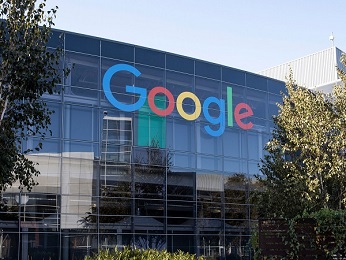
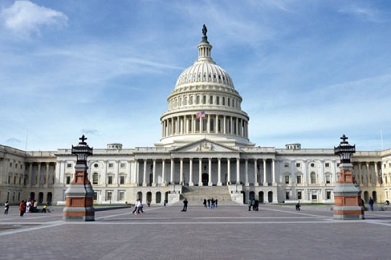
Will It End with Google’s Surrender?
Regarding the controversy, Google announced that it would decrease the rate of commission by 15% for apps with sales of less than $1 million. However, even if the fee rate becomes lower, the reduction in the total fee sales would be about 2.2%, so this reduction is only an ostensible action to quieten the ongoing controversy. Google said they plan to invest an additional $100 million to develop the digital content ecosystem in Korea, but this is just to temporarily calm public opinion considering Google’s sales in Korea last year, which was about $1.2 billion. If the prevention of payment compulsory in the Act is enacted, Google will not be the only one to collapse. Since this bill is not targeted only at Google, the Galaxy Store and ONE Store will also be illegally collecting fees using in-app payments. So it can block the growth of domestic companies while trying to tackle Google. Google announced that they would postpone the in-app payment compulsory policy once again and will implement it in March 2022. In turn, effective legislation is necessary to prevent the high-handedness of Big Tech.
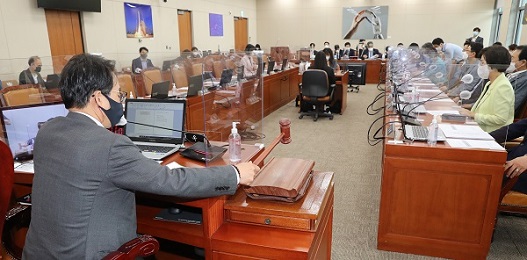
Now that the pandemic has made the mobile app a commodity of humanity, it would be no exaggeration to say that the world of apps is under Google’s control. With no Goliath to overwhelm Google, Google’s monopoly indicates room to dominate even the reality beyond the world of apps. Therefore, it is time to think about whether Google’s management as an app tollkeeper is opposed to the openness policy that it initially advocated.
